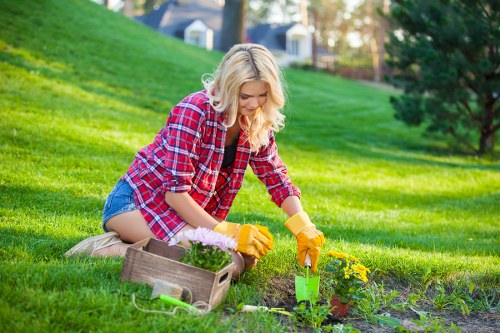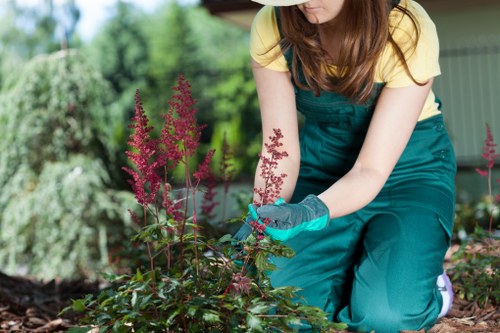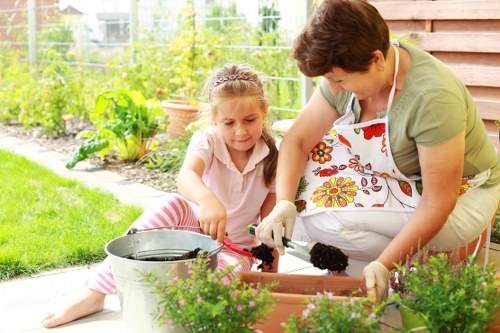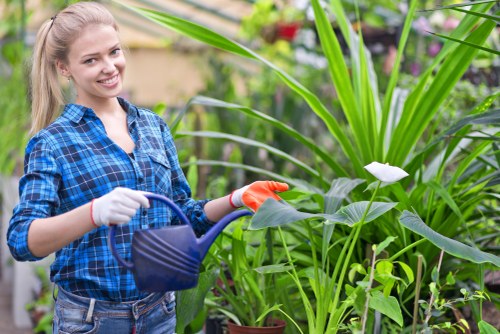Comprehensive Guide to Garden Maintenance in Notting Hill

Maintaining a beautiful garden in Notting Hill requires a blend of **dedication**, **knowledge**, and the right techniques. Whether you're a seasoned gardener or just starting, understanding the unique aspects of garden care in this vibrant London neighborhood is essential for achieving a lush, thriving outdoor space.
Notting Hill's climate, characterized by mild temperatures and ample rainfall, provides an excellent environment for a variety of plants. However, the urban setting also means gardeners must contend with factors like pollution, limited space, and specific soil conditions. Tailoring your garden maintenance routine to these local conditions can make all the difference.
In this guide, we'll explore the key elements of garden maintenance in Notting Hill, offering practical tips and insights to help you create and sustain a garden that not only complements your home but also enhances the overall aesthetic of the neighborhood.
Understanding the Local Climate

Notting Hill enjoys a temperate maritime climate, which is ideal for a wide range of plants. However, understanding the local weather patterns is crucial for effective garden maintenance. The area experiences mild winters and warm summers, with rainfall distributed fairly evenly throughout the year.
One of the challenges gardeners face in Notting Hill is the occasional frost during winter months. Protecting sensitive plants from frost damage is essential. Additionally, the area can experience periods of drought during summer, so implementing efficient watering systems is beneficial.
By aligning your garden maintenance schedule with the local climate, you can ensure that your plants receive the care they need at the right times, promoting healthy growth and resilience against adverse weather conditions.
Essential Garden Maintenance Tasks

Regular garden maintenance involves a series of tasks that keep your outdoor space looking its best. These tasks can be categorized into daily, weekly, and seasonal activities.
- Weeding: Keeping weeds under control prevents them from competing with your plants for nutrients and water.
- Pruning: Regular pruning helps maintain plant health, encourages new growth, and shapes your garden.
- Lawn Care: Mowing, aerating, and fertilizing your lawn are essential for a lush, green appearance.
In addition to these tasks, monitoring for pests and diseases is vital. Early detection and treatment can prevent significant damage and preserve the integrity of your garden.
Seasonal Garden Care

Each season brings its own set of challenges and opportunities for garden maintenance in Notting Hill. Adapting your care routine to the changing seasons ensures that your garden remains vibrant year-round.
- Spring: Focus on planting new blooms, pruning shrubs, and preparing the soil for the growing season.
- Summer: Implement efficient watering systems, mulch to retain moisture, and manage pests.
- Autumn: Rake fallen leaves, plant bulbs for spring, and prepare plants for winter.
- Winter: Protect sensitive plants from frost, prune deciduous trees, and plan for the next growing season.
Understanding the specific needs of your garden during each season allows you to maintain its health and beauty throughout the year.
Choosing the Right Garden Maintenance Service

For those who prefer not to handle garden maintenance themselves, hiring a professional service in Notting Hill can be a wise investment. When selecting a garden maintenance company, consider the following factors:
- Experience: Look for services with a proven track record in garden care, particularly in urban settings like Notting Hill.
- Licensed and Insured: Ensure the company is properly licensed and insured to protect against any potential liabilities.
- Customer Reviews: Check testimonials and reviews to gauge customer satisfaction and the quality of work provided.
- Services Offered: Make sure the company offers the specific maintenance tasks you require, whether it's regular mowing, pruning, or pest control.
By carefully selecting a reputable garden maintenance service, you can enjoy a beautiful garden without the hassle of doing it yourself.
DIY vs. Professional Garden Maintenance

Deciding between DIY garden maintenance and hiring professionals depends on several factors, including your gardening skills, available time, and budget.
**DIY Garden Maintenance** allows for personal satisfaction and complete control over your garden's upkeep. With the right tools and knowledge, you can manage tasks efficiently and foster a deeper connection with your outdoor space.
On the other hand, **Professional Garden Maintenance** offers expertise and saves time, especially for complex tasks or extensive gardens. Professionals can provide tailored solutions and ensure that maintenance is carried out effectively, allowing you to focus on other priorities.
Sustainable Garden Practices

Incorporating sustainable practices into your garden maintenance not only benefits the environment but also promotes a healthier garden. Here are some strategies to consider:
- Composting: Recycling garden waste into compost enriches the soil and reduces landfill waste.
- Rainwater Harvesting: Collecting rainwater for irrigation conserves water and lowers utility bills.
- Native Plants: Choosing native species requires less maintenance and is better adapted to local conditions.
- Organic Pest Control: Using natural methods to manage pests minimizes chemical usage and protects beneficial insects.
Implementing these sustainable practices ensures that your garden maintenance is environmentally friendly and promotes long-term garden health.
Tools and Equipment for Effective Garden Maintenance

Having the right tools and equipment is essential for efficient garden maintenance. Investing in quality tools can make tasks easier and more enjoyable.
- Pruning Shears: Essential for shaping plants and removing dead growth.
- Lawn Mower: Keeps your grass at an optimal height for health and appearance.
- Garden Hose: A reliable hose with adjustable nozzles allows for precise watering.
- Wheelbarrow: Facilitates the transportation of soil, plants, and debris.
- Compost Bin: Enables easy recycling of garden waste into valuable compost.
Maintaining your tools and replacing them as needed ensures that your garden maintenance tasks are carried out effectively and safely.
Pest and Disease Management

Managing pests and diseases is a critical aspect of garden maintenance. Early detection and proactive measures can prevent minor issues from becoming major problems.
Regularly inspecting your plants for signs of pests or disease allows for timely intervention. Implementing integrated pest management (IPM) strategies, which combine biological, cultural, and mechanical methods, can effectively control pest populations while minimizing environmental impact.
Using disease-resistant plant varieties and maintaining proper garden hygiene also contribute to reducing the risk of infestations and infections.
Soil Health and Fertilization

Healthy soil is the foundation of a thriving garden. Understanding and managing soil health is essential for successful garden maintenance in Notting Hill.
Conducting regular soil tests helps determine nutrient levels and pH balance, guiding appropriate fertilization practices. Adding organic matter, such as compost, improves soil structure, enhances nutrient availability, and promotes beneficial microbial activity.
Choosing the right type of fertilizer—organic or synthetic—depends on your garden's specific needs and your personal preferences for sustainability.
Plant Selection and Diversity

Selecting the right plants is crucial for garden maintenance. Choosing species that are well-suited to Notting Hill's climate and soil conditions reduces maintenance efforts and enhances garden resilience.
- Perennials: These plants return year after year, providing consistent beauty with minimal replanting.
- Annuals: Offer vibrant, seasonal color and can be rotated to add variety to your garden.
- Shrubs and Trees: Provide structure and can create natural boundaries or focal points in your garden.
Diversifying plant species not only creates a visually appealing garden but also supports biodiversity, attracting beneficial insects and wildlife.
Irrigation Systems for Efficient Water Use

Efficient irrigation is a key component of effective garden maintenance. Implementing the right irrigation systems ensures that your plants receive the appropriate amount of water, reducing waste and promoting healthy growth.
Options include drip irrigation, which delivers water directly to plant roots, and soaker hoses, which provide gentle watering for garden beds. Installing a rainwater harvesting system can further enhance water efficiency by utilizing natural rainfall.
Automating your irrigation system with timers and moisture sensors can optimize water usage, making your garden maintenance routine more streamlined and environmentally friendly.
Mulching for Garden Health

Mulching is an effective practice that offers multiple benefits for garden maintenance. Applying a layer of mulch to your garden beds helps retain soil moisture, suppress weeds, and regulate soil temperature.
Organic mulches, such as bark, straw, or compost, gradually decompose, enriching the soil with nutrients. Inorganic mulches, like gravel or rubber, provide long-lasting weed control but do not contribute to soil fertility.
Choosing the right type of mulch depends on your garden's specific needs and aesthetic preferences. Regularly replenishing mulch ensures continued benefits and maintains the appearance of your garden.
Lighting and Aesthetics

Outdoor lighting enhances the beauty and functionality of your garden, extending its usability into the evening hours. Proper lighting can highlight architectural features, illuminate pathways, and create a welcoming ambiance.
- Pathway Lights: Improve safety by illuminating walkways and prevent tripping hazards.
- Spotlights: Highlight specific plants, sculptures, or architectural elements.
- Ambient Lighting: Creates a soft, inviting atmosphere for outdoor gatherings.
Selecting energy-efficient lighting options, such as LED or solar-powered fixtures, aligns with sustainable garden practices and reduces energy consumption.
Regular Maintenance Schedule

Establishing a regular maintenance schedule is essential for keeping your garden in optimal condition. A well-planned routine ensures that tasks are performed consistently, preventing neglect and promoting plant health.
Create a calendar that outlines daily, weekly, and monthly tasks tailored to your garden's specific needs. Incorporate seasonal adjustments to address changes in weather and plant growth cycles.
Sticking to your maintenance schedule not only simplifies garden care but also helps you stay organized and efficient in managing your outdoor space.
Innovative Garden Technologies

Advancements in technology have transformed garden maintenance, making it easier and more efficient. Incorporating innovative tools and systems can enhance your gardening experience.
Smart irrigation controllers adjust watering schedules based on weather data, optimizing water usage. Automated lawn mowers and robotic garden assistants can handle routine tasks, saving you time and effort.
Additionally, garden management apps provide tools for planning, tracking plant health, and scheduling maintenance tasks, ensuring that your garden receives comprehensive care.
Community Gardens and Shared Spaces

Notting Hill is home to several community gardens and shared green spaces that foster a sense of community and promote sustainable garden practices.
Participating in community gardening initiatives allows you to share resources, knowledge, and labor with fellow gardeners. It also provides access to a wider variety of plants and gardening techniques.
Engaging in these communal efforts not only enhances your gardening skills but also contributes to the overall beauty and sustainability of Notting Hill.
Incorporating Wildlife into Your Garden

Creating a garden that supports local wildlife is both rewarding and beneficial for the ecosystem. Introducing elements that attract birds, bees, butterflies, and other beneficial creatures enhances biodiversity and pollination.
Planting native flowers and shrubs provides food and habitat for various species. Installing birdhouses, bee hotels, and bat boxes encourages wildlife to take residence in your garden.
Maintaining a diverse and balanced garden ecosystem reduces the need for chemical interventions and promotes natural pest control.
Maintaining Garden Structures

Garden structures, such as fences, pergolas, and gazebos, add functionality and aesthetic appeal to your outdoor space. Regular maintenance of these structures ensures their longevity and safety.
Inspect for signs of wear, such as rust, rot, or damage, and perform necessary repairs promptly. Cleaning and treating wooden structures can prevent decay and extend their lifespan.
Proper maintenance of garden structures enhances the overall beauty of your garden and provides a stable framework for supporting plants like climbing vines and flowering species.
Gardening for Health and Well-being

Gardening offers numerous benefits for mental and physical health. Engaging in regular garden maintenance can reduce stress, improve mood, and provide moderate exercise.
Spending time outdoors in a well-maintained garden encourages mindfulness and relaxation, fostering a deeper connection with nature. Additionally, cultivating your own vegetables and herbs promotes healthy eating habits.
Investing in garden maintenance not only beautifies your environment but also enhances your overall well-being.
Conclusion and Next Steps

Maintaining a garden in Notting Hill is a rewarding endeavor that combines aesthetic appeal with environmental stewardship. By understanding the local climate, performing essential maintenance tasks, and incorporating sustainable practices, you can create a thriving outdoor space that brings joy and tranquility.
Whether you choose to undertake garden maintenance yourself or enlist the help of professionals, the key is consistency and attention to detail. Embrace the beauty of Notting Hill by cultivating a garden that reflects your personal style and commitment to sustainability.
Ready to transform your garden? Contact us today to book your garden maintenance service and ensure your outdoor space remains pristine and vibrant all year round.

